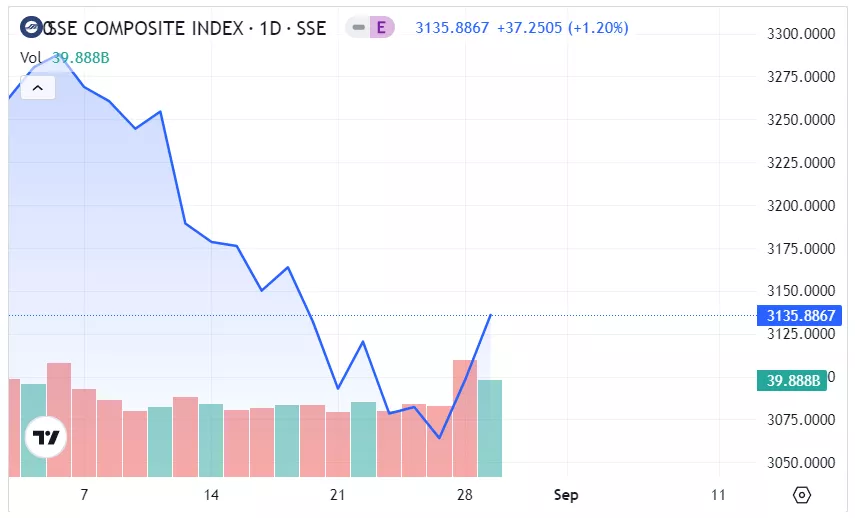Chinese Stocks Extend Gains On Hopes Of Further Stimulus

As we approach the end of August, the global stock market is set for its worst month of the year. Following an explosive first half to 2023, equities have come under pressure this month as Chinese economic gloom and high-interest rates weigh on investor sentiment.
After gaining almost 20% in the first seven months of the year, the S&P 500 is down more than 3% in August. Meanwhile, the MSCI World Index, which tracks the performance of large and mid-cap companies across 23 developed countries, is down more than 4%. Saving a turnaround, both of these indices appear on course for their worst performance since December.
What else has happened so far this week? And what can we expect from the rest of it?
Chinese and Hong Kong Equities Pare Gains on Monday
Deflation, a turbulent property market, weak domestic demand, and falling exports - are just some of the concerns weighing on the Chinese economy at present.
After the removal of some of the world’s strictest COVID-19 restrictions at the end of last year, many were expecting an explosion of growth from China in 2023. However, a slew of negative economic data paints a picture of a country that is struggling to recover from its pandemic-era restrictions.
On Monday, news that Beijing would halve stamp duty led to a rally in Chinese and Hong Kong stocks. After closing on Friday down by 6.89% and 10.57% respectively for the month, the Shanghai Composite and the Hang Seng Index opened 5.06% and 3.13% higher on Monday.
Yet the rally was to be short-lived. Both indices retreated during the day and closed the session with more moderate gains of 1.12% and 0.97% respectively. Nevertheless, on Tuesday, both indices were up again, with the Shanghai Composite and Hang Seng closing the session up by 1.20% and 1.93% respectively.

Source: TradingView - Past performance is not a reliable indicator of future results.
Investors Eye US Inflation and Jobs Data
Last week, Federal Reserve Chair Jerome Powell said that the Fed is “prepared to raise rates further” in the battle to bring US inflation down to its target rate of 2%.
This news is likely to bring into focus two important economic releases from the US this week, the Personal Consumption Expenditure (PCE) index on Thursday and Friday’s monthly job data.
The PCE, which measures the price of goods and services purchased by consumers for the purpose of consumption, is the Fed’s preferred measure of inflation and will be widely watched by investors ahead of the central bank’s interest rate decision next month.
The PCE index is expected to rise to 3.3% in the 12 months leading to July whilst Core PCE, which strips out volatile food and energy prices, is forecast to increase to 4.2%.
Meanwhile, Friday’s nonfarm payroll - which measures the change in the number of people employed from the previous month, excluding the farming industry – is expected to see the addition of 170,000 jobs in August, down from 187,000 in July.
Eurozone Inflation and the ECB
Last week, data showed that Eurozone businesses had been victim to falls in both output and new orders, with business activity falling to its lowest level since November 2020. Consumer confidence also dropped, despite having been expected to improve.
This weak data places the European Central Bank (ECB) in a complicated position ahead of its interest rate decision next month. Whilst the central bank is keen to tackle inflation, which remains elevated, it will naturally want to do so without sparking a recession. Consequently, last week’s data has fuelled speculation that the ECB will pause its rate hiking cycle at its next meeting.
Eurozone inflation has halved since its peak of 10.6%, and is expected to fall again to 5.1% in August when the latest data is released on Thursday. This anticipated fall could be enough to convince the ECB to hold interest rates steady at September’s meeting. However, if inflation comes in worse than expected, the central bank may be forced to adopt a more hawkish stance.
More By This Author:
Investors Look Toward Jackson Hole Symposium Key SpeechesAll Eyes On The Jackson Hole Symposium
Markets Focus On Chinese House Prices, US Retail Sales And UK Inflation
Disclaimer: This material does not contain and should not be construed as containing investment advice, investment recommendations, an offer of or solicitation for any transactions in financial ...
more


